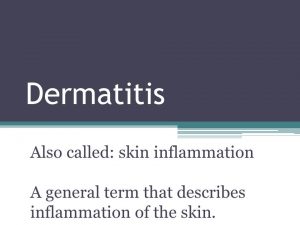
My scalp always burns when I get my hair colored.
My hands are always broken out.
This rash near my eye never seems to clear.
My new body piercing always seems infected.
The doctor gave me a steroid cream for my rash but it seems to be making it worse!
My skin is so sensitive that I can break out even when I use products labeled for “sensitive skin”!
The verdict: It’s an irritant rash

If you have ever experienced any of these problems, you may be suffering from contact dermatitis, which is a red, itchy rash that is caused by a substance that comes in contact with your skin. There are two types of contact dermatitis, allergic and irritant.
Irritant contact dermatitis, as the name implies, is a form of dermatitis that occurs when the skin is damaged by direct exposure to a chemical or physical irritant. Frequent exposure to mild or moderately acidic or alkaline substances such as detergents, solvents or cleansers, frequent hand-washing, scratchy clothing, and cold dry air can all cause irritant contact dermatitis. It’s best to avoid exposure to these irritants. You can do this by wearing gloves when working with chemical substances at work or when using household cleansers. Both of these suggestions will help prevent irritant contact dermatitis, as will the use of hand creams after hand washing.
Time to see an allergist
 The other type is allergic contact dermatitis. This is when your body forms an allergic response to a substance to which you are exposed. Sometimes this can be to occur with something to which you have no previous issues. A rash caused by allergic reaction can be a flat red rash, or you could see papules (small bumps), vesicles (blisters), or the skin can appear scaly or thickened. In some cases, the rash can drain or be oozy. Metals, fragrances, preservatives, rubber products, antibiotics and even topical steroid creams can cause a contact allergy rash. Identification and avoidance of the substances to which you are allergic is essential to treating this condition.
The other type is allergic contact dermatitis. This is when your body forms an allergic response to a substance to which you are exposed. Sometimes this can be to occur with something to which you have no previous issues. A rash caused by allergic reaction can be a flat red rash, or you could see papules (small bumps), vesicles (blisters), or the skin can appear scaly or thickened. In some cases, the rash can drain or be oozy. Metals, fragrances, preservatives, rubber products, antibiotics and even topical steroid creams can cause a contact allergy rash. Identification and avoidance of the substances to which you are allergic is essential to treating this condition.
If you are concerned you may be suffering from allergic contact dermatitis, your allergist will be able to help you determine the right kind of testing and treatment options to get your skin back to looking and feeling its best.
Schedule an appointment today!
Category: Uncategorized



